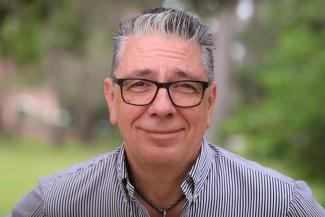Vladimir Dobrosavljevic
Professor

Contact Information
Department
Physics
Office Location
611 KEN
Email
Phone
4-9755 or 4-5693
Personal Website
Educational Background
- 1988 Ph.D., Physics , Brown University , Providence, RI
- 1985 M.S., Physics , Brown University, Providence, RI
- 1983 B.S., Physics University of Belgrade, Yugoslavia
Research Interests
- The subject of metal-insulator transitions came to a renewed focus in the twenty five years, following the discovery of high temperature superconductivity, which triggered much activity in the study of bad metals. Many of the materials in this family consist of transition metal or even rare earth elements, corresponding to compounds which are essentially on the brink of magnetism. Here, conventional approaches proved of little help, but recent research has lead to a veritable avalanche of new and exciting ideas and techniques both on the experimental and the theoretical front. In the last twelve years, a systematic new approach to strong correlations has been developed, based on dynamical mean-field theory (DMFT) methods. Our recent results have demonstrated that all the basic localization mechanisms and processes can be described within extended DMFT framework, and have produced a number of results of direct experimental relevance. These include:
- Theory for Anderson localization effects in presence of strong correlations.
- Description of localization-induced Griffiths phases leading to non-Fermi liquid
- (and/or spin liquid) metallic behavior.
- Theory describing how glassy behavior of electrons emerges in the vicinity of disorder-driven metal-insulator transitions.
- Some of the subjects that we have introduced have, in the last few years, become topics of central interest and much activity. This is especially true for glassy phenomena that emerge in many electronic systems with disorder. Topics related to non-equilibrium quantum dynamics are subjects of several upcoming major international workshops and meetings. For example, I acted as the principal organizer of the workshop SPICE-Workshop: "Bad Metal Behavior in Mott Systems: From Holographic Duality to Mottronics, Synaptic Devices, and Beyond", held at Schloss Waldthausen, Mainz, Germany, June 29 July 2, 2015. I believe that this direction for research offers a great deal of promise and will continue to attract increased attention in the coming years. Materials where these phenomena are of central importance are surprisingly numerous, ranging from two dimensional electron gases in MOSFETs, diluted magnetic semiconductors, CMR manganites and high Tc cuprates. Our theoretical approaches are very flexible and useful tools that should play a central role in this emerging field.
- My research has been funded by the National Science Foundation through the following grants:
- DMR-9974311 ($150,000; 1999-2002)
- DMR-0234215 ($240,000; 2003-2005)
- DMR-0542026 ($330,000; 2006-2010)
- DMR-1005751 ($345,000; 2010-2014)
- DMR-1410132 ($360,000; 2014-2018)
- DMR-1822258 ($375,000; 2018-2021)
- DMR-2411279 ($406,000; 2024-2028)
Professional Experience
- 2006-present, Professor, Florida State University
- 2006-2018, Director, CMS-Theory
- 2001-2006, Associate Professor, Florida State University
- 1995-2001, Assistant Professor, Florida State University
- 1991-1995, Postdoctoral Research Associate, Rutgers University
- 1989-1991, Postdoctoral Research Associate, University of Maryland
- 1988-1989, Postdoctoral Research Associate, Brown University
- 1984-1988, Research Assistant, Brown University
Awards, Honors, and Service
- Graduate Faculty Mentor Award, FSU (2024)
- PAI Award for Excellence in Teaching and Research (2011)
- American Physical Society Fellow (2010)
- Marko V. Jaric Prize for Outstanding Scientific Achievement in Physics (2009)
- Developing Scholar Award (2003)
- Alfred P. Sloan Foundation Fellow (1997)
- First Year Assistant Professor Award, FSU (1996)
- Sigma Xi Award for outstanding research work in physics (1986)
- Materials Research Society Student Award (1985)
- University Fellowship, Brown University (1983)
